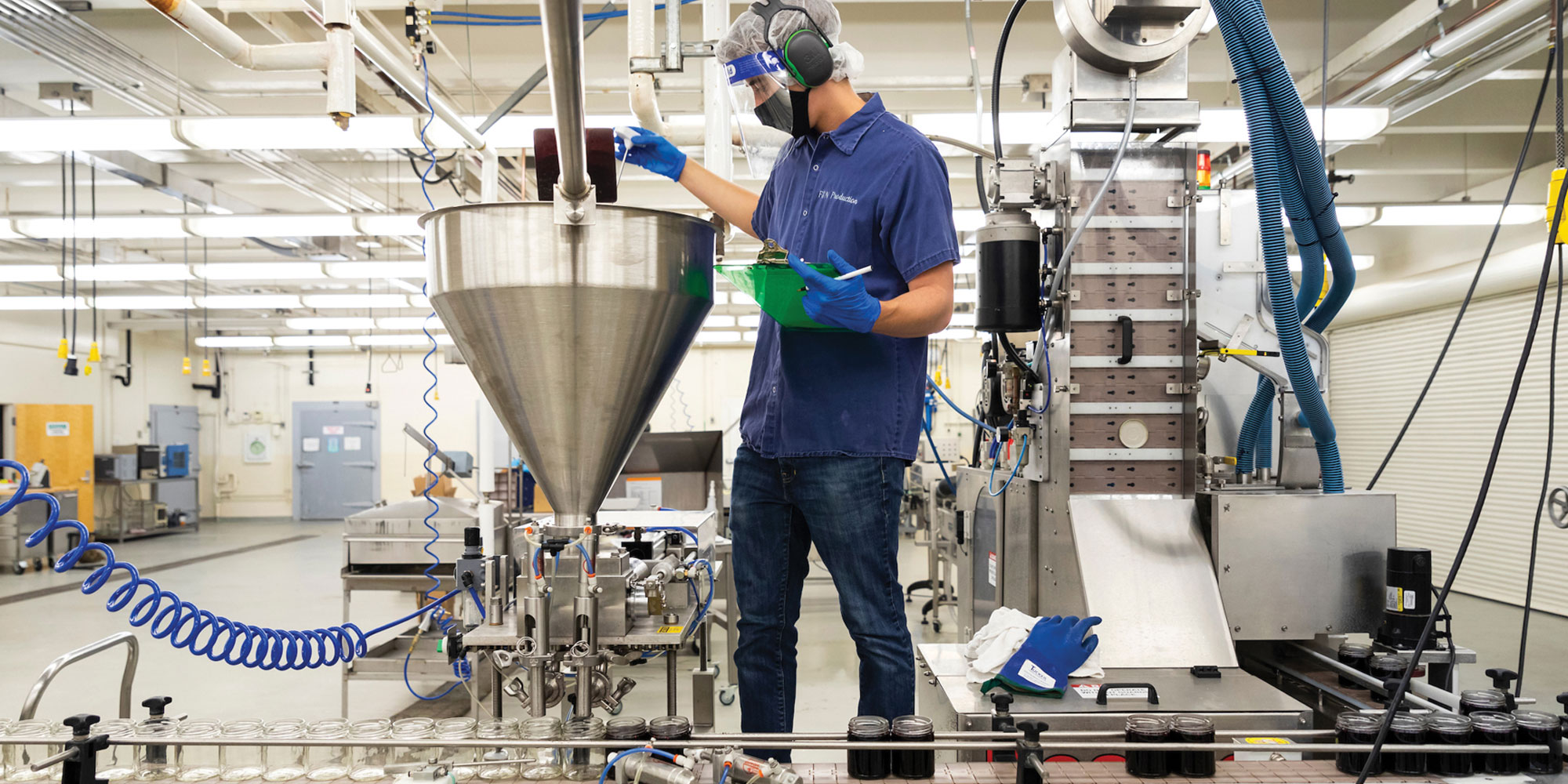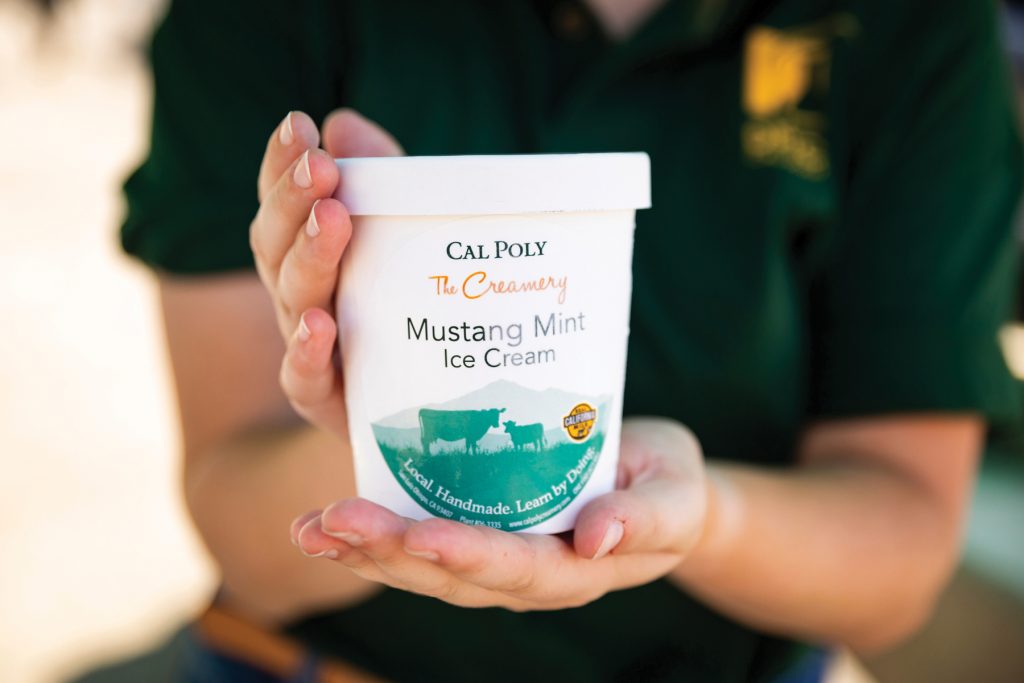
Cal Poly’s Field to Fork Practicum
“Learn by Doing” is Cal Poly’s motto, mantra, way of life. And, gosh darn it, they’re doing it.
Take Allison Bright Rose, who attended Cal Poly until 1999. She was a Food Science major and Agribusiness minor, now still with vivid recall of Elements of Food Processing, which she studied her freshman year. “We made BBQ sauce and olallieberry jam in the pilot plant under the direction of Dr. Montecalvo. I have more distinct memories of lessons in the pilot labs than any other lecture. I enjoyed learning how larger scale processing operations worked. I also loved making food and sharing it with my family.”

Allison is now a food safety auditor in her professional career, and she can pinpoint her start in the industry to the Cal Poly labs and pilot plant. “It gave me many opportunities to learn how to work with a variety of people in actual operations. The professors modeled and cultivated the real world observation and communication skills in lab settings, while teaching us practical, necessary food knowledge. One of my aerospace engineering friends was very surprised when I could help him remember the formula for the heat transfer coefficient. He was upset when I told him I learned it when I was making BBQ sauce in class! We got to eat great food more than any other majors on campus.”

Hands-on learning experiences are built into the curricula and the majority of students graduate with lab, internship and launched business ventures under their belts — from voluntary involvement to class requirements. Because of the quality of the student-made products being churned out, the San Luis Obispo-based, public university sells a plethora of them: BBQ sauce? Got it. Cheese? Yes, sir. Chocolate? Yup. Win? Do you even have to ask?


Cal Poly’s Mustang Mint Ice Cream and Madonna Alpine Cheese, made by students in the school’s hands-on food processing lab; Student-made foods have been a part of Cal Poly’s education system since the 1920.
And the local community benefits. SLO local and Cal Poly student Sarah Attala has grown up purchasing Cal Poly student-made goods. “My family and I have bought Cal Poly’s wine, barbecue sauce and jam. Because my parents both went to Cal Poly, we love supporting the school and students by purchasing their products,” she says.
“The best student-made product that I have tried is Cal Poly’s chocolate bars because of their natural ingredients. It’s a heavenly taste,” shares Zoe Petty, a junior at the school.
Student-made foods have been a part of Cal Poly’s education system since the 1920s, when the university repositioned itself after World War I, was placed under the control of the California State Board of Education and a path to higher education offerings was forged. According to the U.S. News & World Report’s 2021 rankings, Cal Poly tied for first place in the category, “Most Innovative Schools Regional Universities West”.
AnnMarie Cornejo, communications specialist for the Cal Poly’s College of Agriculture, Food and Environmental Services, explains that the students learn numerous life skills that will help them as they enter the workforce and additionally, their work “ensures that the daily maintenance and operations of the college’s food and agricultural lands and facilities, including the 500-cow dairy, are well managed.”
Alumnus Raven Lukehart recalls her participation as a student years ago. “The Learn by Doing instruction and enterprises gave me hands-on experience that students from other colleges simply did not get. I gained a major understanding of production. This resulted in better decision making in my career and made me more capable in management of my husband’s family farm.” Raven is the General Manager of the popular Avila Valley Barn and Gopher Glen Organic Apple Farm.
“These students are exposed to research and development, modern manufacturing practices, quality assurance, food safety as well as sales and marketing,” says Molly Lear, supervisor and overseer of the production of the student-made jams, barbecue sauce and chocolates, sales of which fund the programs.
This means the students are given an enormous responsibility, both fiscally and operationally. Sophomore Jessi-Ryah Cordova has worked with the Cal Poly Dairy for two years now. She oversees the handling of invoices, the creation of operation spreadsheets and the collection of herd inventories, and helps hire incoming students. With 14 milkings per week, every day of the year, students like Jessi-Ryah are the main workforce.
Kate Thompson, a third year Agriculture Communications major shares, “Students live on the dairy in student housing and work to keep the program running. Most students that work here wake up at 3am to go milk the cows by 3:45am. Even during the pandemic, students who lived and worked on the dairy stayed in San Luis Obispo to care for these animals.”
To these students, it’s as much their businesses, their programs and their products as they are Cal Poly’s. And through the current pandemic, they have pivoted to reach the San Luis Obispo community, such as through contact-free drive-thru services to sell the products to locals, which is a service that the Cal Poly Creamery and the J and G Lau Family Meat Processing Center have provided.

For those customers still shopping traditionally, Cal Poly foods including ice cream, jam, cheese, wine, eggs, chocolate and meats are found on campus, at farmers’ markets and in retail outlets throughout the county, including Vons, Crushed Grape, Madonna Inn Gift Shop, The Mercantile and Spencer’s Fresh Market.

